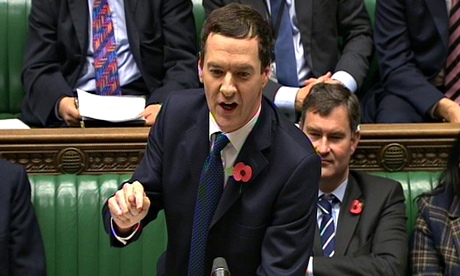Chancellor George Osborne will disguise the harm he means to do in the autumn statement, but Labour and the Lib Dems are trapped in me-too territory

Never – probably – in the history of political conflict will so many be misled by so few as in Wednesday’s autumn statement. If the chamber had a polygraph and a Geiger counter to measure radioactive levels of untruth, the place would bleep so loud nothing else would be heard. On all sides barely an honest word will be spoken, including the ifs and the buts.
Yet if the public groans that the yah-booing parties are “all the same”, they would be wrong. Far from it – the parties will be lying about very different things for different reasons. Rarely have they been so far apart in true intentions.
George Osborne will disguise the harm he means to do with his unmentionable £48bn cuts, for fear of frightening voters. Labour will lie about the relative good they mean to do, for fear that fiscal laxity frightens them too. Osborne will be the wolf in sheep’s clothing, bearing sham gifts to the NHS, road users and, maybe, orchestras. Labour will struggle to look wolfish enough, hiding plans to protect public services from the worst by cutting the deficit more slowly. How mad is this?
Here’s Osborne’s situation: he will trumpet 3% growth and falling unemployment while rattling past rising debt and deficit – targets missed by light years as benefits spending shoots up due to housing costs and low pay. Empty Treasury coffers will be slid past, as his “miracle jobs” pay too little to contribute tax. His bold-faced claim that he can afford an NHS bung (not new money) because growth has yielded rewards is just, well, a lie. The Institute for Fiscal Studies, the Resolution Foundation and others warn that Osborne’s cuts will feel far deeper and harsher, wiping out whole departments and leaving councils with only their statutory spending.
This time, as Gavyn Davies warns in the Financial Times, there will be no quantitative easing to smooth the path. Austerity unbound awaits. Even the tactfully conservative estimate of the Office for Budget Responsibility says Osborne’s austerity wiped 1% off growth: his next dose could do even more damage. That’s why the Oxford economics professor Simon Wren-Lewis finds these plans “scarcely credible”. The only possible explanation is ideological, not economic, he says. It “represents a shrinking of the UK state that is unprecedented”.
Cuts Osborne dare not speak are listed by the ConservativeHome website: abolish whole departments, cut more public jobs and pay. An affordability commission will monitor fairness between generations (not between rich and poor) as cover for trimming pensioner perks so far guarded by David Cameron, even the cripplingly costly “triple lock” for rich and poor pensioners alike. The Tory MP Dominic Raab, writing in the Telegraph, expects £20bn to be stripped from Whitehall’s “sprawling bureaucracy”(already cut by a third and denuded of capability) and reduced benefits and public-sector pay, despite five years of cuts.
But Osborne won’t explain how he can make a £100bn deficit vanish in three years, Tommy Cooper-style, just like that. You could accuse him of double-bluff: neither the IFS nor many economists outside the Tory omerta think he can do it – or that he should. It would cause government-terminating rebellion. Osborne has slipped his timetable by several years, but it has brought none of the disasters he warned of in Labour’s “less deep, less fast” plans. Markets happily buy British debt: losing that triple AAA credit rating had no consequences. He can pass his own fiscal responsibility nonsense law – but so what? All such declaratory laws are unworkable – including Labour’s child poverty and equality acts. This is no trap for Labour: Osborne has blithely ignored them all, as inequality rises and social mobility falls.
Now he plans to take from the poor to gift the rich. The Resolution Foundation shows how his raising of the personal tax allowance and higher rate thresholds will give £35 a year to the bottom tenth and £649 to the top, with most money going to the top half. Worse still, on The Andrew Marr Show Osborne said its £7bn cost would be seized from benefits.
Also look out for Osborne in an even more preposterous disguise – George, champion of the north. With hair flattened from hard-hat photo ops, he will promise investment that doesn’t begin to repair his harrowing of the north. David Blunkett, speaking for Sheffield, was spitting teeth last week at Osborne’s abolition of the regional development agency only to rebadge the remaining third as his “growth fund”. Worse, Osborne not only shifted council funding from poorer to richer areas, but Blunkett shows Osborne has taken EU funds specifically granted for poorer places away from Sheffield (cut by 61%) and Liverpool (cut by 57%) to give to better-off areas. Northern investment will be no more than a veneer over previous cuts. Nor will £15bn for road and rail – destined for the marginals – be new money.
Labour should be in clover. Watch Ed Balls gloat at every hideous debt and deficit reveal. But one day’s glee comes at a high cost, if mocking Osborne’s failure to cut more pretends Labour is on the same path. In fact, as Wren-Lewis spells out, there has rarely been a wider gap between the two parties: Labour has taken a £30bn leeway on current spending, more on capital borrowing to invest, but dare not say so. A typical example of Labour pretending to mimic the Tories is its own tax cut, reintroducing the 10p tax rate, which uses the same fiction that it’s for low earners, though most goes to the top. But here’s the key difference: it’s a very small gesture. The Tories will spend £5bn on tax cuts for the well off, Labour less than £1bn.
Labour is trapped, not by Osborne’s fantasy law which they should vote against, but by staying in the me-too rhetorical territory on the deficit, cuts and taxes. If they win, they have no intention of following Tory plans, but – beyond taxing the rich more – dare not say so. They have left it perilously late to chart the opposite course: to say that more borrowing would do little harm for now, that capital borrowing is good for a huge boost to housing, or to warn that austerity is the real danger to growth.
Labour, the Tories and the Lib Dems all agree that the public can’t take much honesty. The truth will kill those who try it, they fear. The Tories won’t admit to £48bn cuts, with which the Lib Dems mostly concur; Labour dare not trust voters with their more gentle plans, for fear of looking fiscally soft. And so the cycle of mistrust between people and politics ratchets up. One economist calls this the “candour deficit” – and in the end, that may be the deadliest political poison of all.

No comments:
Post a Comment